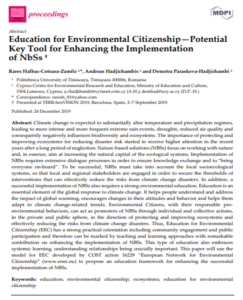Education for Environmental Citizenship—Potential Key Tool for Enhancing the Implementation of NbSs
Halbac-Cotoara-Zamfir, R., Hadjichambis, A., & Paraskeva-Hadjichambi, D. (2019). Education for Environmental Citizenship—Potential Key Tool for Enhancing the Implementation of NbSs. Multidisciplinary Digital Publishing Institute Proceedings, 30(1), 37.

Abstract:
Climate change is expected to substantially alter temperature and precipitation regimes, leading to more intense and more frequent extreme rain events, droughts, reduced air quality and consequently negatively influences biodiversity and ecosystems. The importance of protecting and improving ecosystems for reducing disaster risk started to receive higher attention in the recent years after a long period of neglection. Nature-based solutions (NBSs) focus on working with nature and, in essence, aim at increasing the natural capital of the ecological systems. Implementation of NBSs requires extensive dialogue processes in order to ensure knowledge exchange and to “bring everyone on-board”. To be successful, NBSs must take into account the local socioecological systems, so that local and regional stakeholders are engaged in order to secure the thresholds of interventions that can effectively reduce the risks from climate change disasters. In addition, a successful implementation of NBSs also requires a strong environmental education. Education is an essential element of the global response to climate change. It helps people understand and address the impact of global warming, encourages changes in their attitudes and behavior and helps them adapt to climate change-related trends. Environmental Citizens, with their responsible pro-environmental behaviors, can act as promoters of NBSs through individual and collective actions, in the private and public sphere, in the direction of protecting and improving ecosystems and effectively reducing the risks from climate change disasters. Thus, Education for Environmental Citizenship (EEC) has a strong practical orientation including community engagement and public participation and therefore can be marked by teaching and learning approaches with remarkable contribution on enhancing the implementation of NBSs. This type of education also embraces systemic learning, understanding relationships being crucially important. This paper will use the model for EEC developed by COST action 16229 “European Network for Environmental Citizenship” (www.enec.eu) to propose an education framework for enhancing the successful implementation of NBSs.
